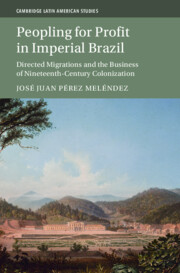 Peopling for Profit in Imperial Brazil
Peopling for Profit in Imperial Brazil Testing the Limits of the State
from Part III - Disentangling Companies and State
Published online by Cambridge University Press: 26 September 2024
This chapter tells the story of two of the most notorious and ambitious company efforts in nineteenth-century Brazil, which, taken together dispel the notion that the end of the “conciliation period” had produced any lasting government neutrality in relation to private enterprise. The Mucury Company, founded by liberal stalwart Teófilo Ottoni, faced unlikely competition from the new Associação Central de Colonização, a state-favored company established in Rio. While Ottoni incorporated agents and techniques from previous colonization efforts, devised his own indigenous appeasement policies, and successfully orchestrated migrations to his flagship colony of Filadelfia, the ACC focused solely on migrant recruitment, transport, and reception, and received ample government subsidies to guarantee shareholder dividends. The ACC quickly overtook Ottoni’s colono recruitment efforts thanks to the support of prime minister Olinda, who was attempting to counter international criticisms of Brazilian colonization and define pertinent regulatory frameworks while harboring distrust toward Ottoni’s political aims. While both companies eventually folded, they did so for different reasons. In turn, the regulations devised by Olinda in his engagement with them became landmark precedents for the era of mass migrations.
To save this book to your Kindle, first ensure [email protected] is added to your Approved Personal Document E-mail List under your Personal Document Settings on the Manage Your Content and Devices page of your Amazon account. Then enter the ‘name’ part of your Kindle email address below. Find out more about saving to your Kindle.
Note you can select to save to either the @free.kindle.com or @kindle.com variations. ‘@free.kindle.com’ emails are free but can only be saved to your device when it is connected to wi-fi. ‘@kindle.com’ emails can be delivered even when you are not connected to wi-fi, but note that service fees apply.
Find out more about the Kindle Personal Document Service.
To save content items to your account, please confirm that you agree to abide by our usage policies. If this is the first time you use this feature, you will be asked to authorise Cambridge Core to connect with your account. Find out more about saving content to Dropbox.
To save content items to your account, please confirm that you agree to abide by our usage policies. If this is the first time you use this feature, you will be asked to authorise Cambridge Core to connect with your account. Find out more about saving content to Google Drive.